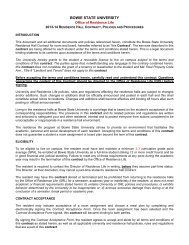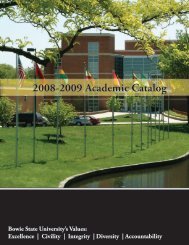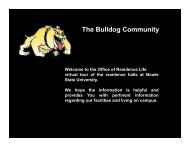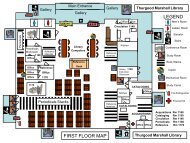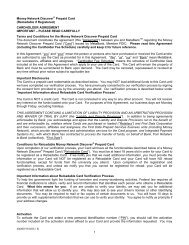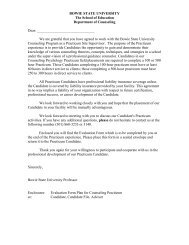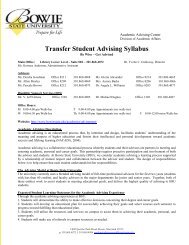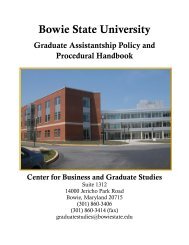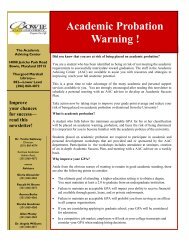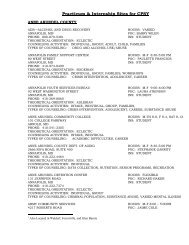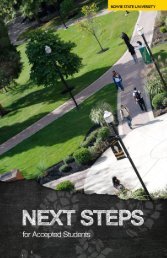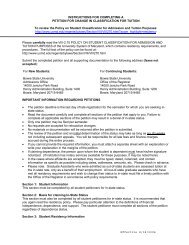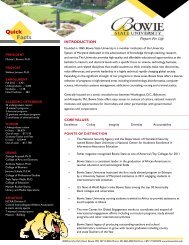2009-2010 - Bowie State University
2009-2010 - Bowie State University
2009-2010 - Bowie State University
Create successful ePaper yourself
Turn your PDF publications into a flip-book with our unique Google optimized e-Paper software.
COSC 473 ARTIFICIAL INTELLIGENCE (FALL) 3 CREDITS<br />
Prerequisite(s): COSC 214. This course is an introduction to basic concepts and techniques of artificial intelligence. Topics include: knowledge<br />
representation, search strategies, fuzzy and probabilistic reasoning, and theorem proving. Applications of AI languages and the design and<br />
construction of Expert Systems are discussed.<br />
COSC 474 MACHINE LEARNING AND DISCOVERY (SPRING) 3 CREDITS<br />
Prerequisite(s): COSC 473. Artificial intelligence techniques for knowledge acquisition by computers. Fundamental problems in machine<br />
learning and discovery. Systems that learn from examples, analogies, and solved problems. Systems that discover numerical laws and<br />
qualitative relationships. Projects centering on implementation and evaluation.<br />
COSC 480 SENIOR CAPSTONE (SPRING) 3 CREDITS<br />
Prerequisite(s): COSC 350, COSC 354, COSC 414. This is a capstone course which integrates the material covered in core courses, namely Data<br />
Structures and Algorithms, Computer Organization, Systems Programming, Programming Languages, Computer Architecture and Operating<br />
Systems. The emphasis is on solving problems which require concepts from more than one area. Selected problems integrating the topics<br />
covered in these courses will be formulated, discussed, and solved.<br />
COSC 485 DATA COMMUNICATIONS AND NETWORKS (FALL) 3 CREDITS<br />
Prerequisite(s): COSC 214 and COSC 254. This course explores the fundamentals of data communication and computer networking: common<br />
carrier implications, tariffs, exchanges, concentrators, multiplexors, and buffering; circuit, message, and packet switching; network<br />
architectures and protocols; protocol standards, modeling, and analysis; cost and design; software considerations are emphasized.<br />
COSC 490 SELECTED TOPICS IN COMPUTER SCIENCE (FALL, SPRING) 3 CREDITS<br />
COSC 491<br />
COSC 492<br />
Prerequisite(s): Consent of Instructor. (Note: COSC 492 may be offered for Cooperative Education credits. Check class schedule or contact the<br />
Computer Science Department for more information). These courses are presentations of selected modern developments, advanced topics,<br />
and problem solving in computer science.<br />
COSC 495 SENIOR SEMINAR IN COMPUTER SCIENCE (FALL) 3 CREDITS<br />
Prerequisite(s): ENGL 361 or ENGL 362 and a minimum of one 400‐level COSC course. Students research topics of interest including issues on<br />
professional ethics and responsibilities (ACM Code of Ethics and Computer Ethics). Written reports and presentations of complete projects are<br />
required.<br />
CRJU: CRIMINAL JUSTICE COURSE DESCRIPTIONS<br />
CRJU 201 INTRO TO LAW ENF & CRJU (Fall, Spring) 3 CREDITS<br />
Prerequisite(s): SOCI 101. This course examines the nature of criminal behavior in society, the functioning of police agencies, the procedures of<br />
prosecutors and judges, other correctional bureaucracies, and other forms of social control in a democratic society.<br />
CRJU 314 STRESS MGMT IN CRJU (Fall, Spring) 3 CREDITS<br />
Prerequisite(s): CRJU 201. This course examines the alarming and detrimental problems of stress and burnout experienced by criminal<br />
justice/law enforcement personnel. Emphasis is placed on the nature of stress, its causes, its consequences, and the various techniques<br />
utilized to manage and control stress at both the individual and group levels.<br />
CRJU 315 VICTIM AND CRIM JUSTICE (Fall, Spring) 3 CREDITS<br />
Prerequisite(s): CRJU 201. This course examines the impact of crime upon a variety of victims, e.g., victims of rape, drunk driving, robbery, and<br />
child and spouse abuse. It considers such topics as victim compensation, victim‐offender relationship, as well as victimless crimes. This course<br />
covers techniques and laws used in dealing with detection, suppression, apprehension, and prosecution of violators. Implications for the<br />
individual and society concerning the control of such behaviors are reviewed and evaluated, as well as alternative social policies.<br />
CRJU 316 ADV CRIM PROC & EVIDENCE (Fall, Spring) 3 CREDITS<br />
Prerequisite(s): CRJU 201. This course is a comprehensive examination of the rules of evidence in criminal cases. Through study of US<br />
Supreme Court cases and rulings, the following criminal procedure issues are examined: burden of proof, testimonial privileges, exclusionary<br />
rule, police searches, admissions and confessions, identification, and physical evidence.<br />
CRJU 317 CORRECTIONS: THE PRISON INDUSTRIAL COMPLEX (Fall, Spring) 3 CREDITS<br />
This course examines how the American penal system developed into a prison industrial complex, reflecting the increased incarceration rates<br />
from the 1970's onward, frequently called “the imprisonment binge.” Topics to be examined include: race and class bias; trend towards<br />
lockdown and supermax facilities; prison labor; prison profits; privatization; prison health care; guard conduct; women in prison; prisoner<br />
struggles and rebellions. A component of this course will include “an inside view” provided by incorporating actual prisoner cases,<br />
communications and writings into class work.<br />
CRJU 403 CRIMINALISTICS I (Fall, Spring) 3 CREDITS<br />
Prerequisite(s): CRJU 201. This course is structured to serve as an introduction to the scientific methods used in modern‐day criminal<br />
investigation and detection of and solution to criminal activity. Many of the vital phases of forensic investigation (forensics) are explored by<br />
means of lecture, laboratory experiments, and other selected applied assignments. Students learn how to accurately recognize what evidence<br />
may exist at a crime scene and what to do with it.<br />
CRJU 404 CRIMINAL LAW: ELEMENTS AND PRINCIPLES (Fall, Spring) 3 CREDITS<br />
Prerequisite(s): CRJU 201 and CRJU 316. This course is a study of the basic concepts underlying criminal law and the essential elements of the<br />
offenses comprising the major crime categories, i.e., crimes against people, crimes against property, sex crimes, and victimless crimes. The<br />
focus is on legal rather than behavioral aspects.<br />
CRJU 405 CRIMINALISTICS II (Fall) 3 CREDITS<br />
Prerequisite(s): CRJU 201, CRJU 316 and CRJU 403. An Introduction to the complex scientific methods used in modern‐day criminalistics with a<br />
concentration on biological evidence, determining cause of death, and the analysis of organic/inorganic matter. You will focus on the<br />
collection, preservation, and analytical study of biological evidence as it relates to criminal activity. Many of the vital phases of forensic<br />
investigation are explored by means of lecture, laboratory experiments, field trips, and other applied assignments. Students will learn how to<br />
accurately recognize analytical techniques such as chromatography, spectophotometry, and other methods that are used to evaluate evidence<br />
collected at a crime scene. Each student will also study the reconstruction of mock biological evidence (i.e. body fluids, stain patterns of blood,<br />
deoxyribonucledic acid) from crime scene scenarios.<br />
348 <strong>2009</strong>‐<strong>2010</strong> Undergraduate Catalog




